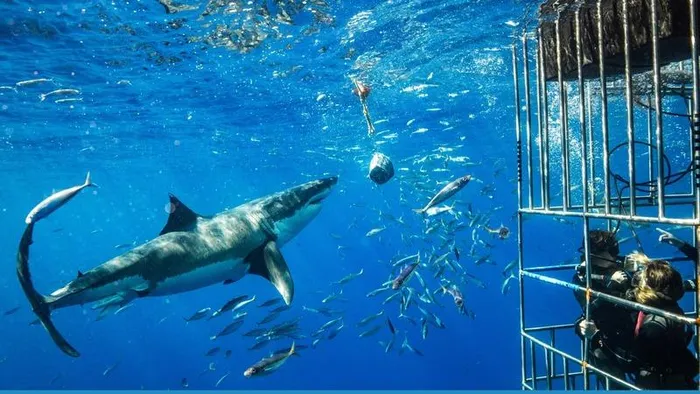A view from the inside: working in shark cage diving

Image: Supplied
Working for a company that offers shark cage diving trips in Cape Town, alongside other ocean-based activities, has given me a unique and deeper understanding of the industry. If you’d asked me a few years ago what a shark diving experience would be like, I would’ve probably imagined sharks aggressively slamming into the cage, large amounts of fish being tossed into the water to attract them, and a situation that felt more like a lion park—but with sharks! How wrong I was.
Gone are the days when Great White Sharks leapt out of the water, chasing unsuspecting seals. While we hope these majestic predators will one day return to our waters in greater numbers, we are fortunate to witness the Bronze Whaler sharks gliding peacefully past our boat. Each trip is different from the next—sometimes, we’re lucky enough to experience the Marine Big 5, and other times we may only see a few sharks, or sometimes, none. The unpredictable nature of the trips is what makes each one so special. It’s not just about the sharks; it’s about immersing yourself in the entire False Bay ecosystem. The experience is magical and humbling.
You might imagine that operators can just head out into the sea and choose where to go, but that's not the case. Every operator is only permitted to operate within a designated area, with strict rules that govern the number of operators allowed and the specific conditions under which we can run our trips. Once we drop anchor, we wait for the sharks. Some days, they appear quickly; on other days, it can take over an hour—or they might not show up at all. I believe this is a clear indication that the sharks are choosing to visit us, not the other way around.
Feeding sharks is strictly prohibited, so we use only a lure and natural fish oils to attract them. No unnatural food sources are involved in the process, ensuring that the sharks interact with us in their own natural, wild way.
Our shark cage diving in Cape Town are much more than a chance to see sharks up close. The crew plays an important role in gathering vital data for shark research projects that contribute to global studies. There are very few vessels that go out frequently enough to collect consistent information on shark sightings, behavior, and environmental conditions.
We’re proud to be part of important scientific efforts focused on studying the False Bay ecosystem as a whole. Without this ongoing research, many people wouldn’t be aware of the decline in the Great White Shark population and the far-reaching effects this has on the local environment.
Rather than disturb this delicate biome, we focus on educating as many people as we can, helping them feel a deeper connection to the wild and understand the importance of preserving it.
I truly hope that sharing my experience from within the industry will help others gain a better understanding of the significance of shark cage diving. It’s not just about thrilling encounters with apex predators—it’s about contributing to critical research, protecting our oceans, and fostering respect and conservation for these incredible animals.
By sharing these insights, I aim to shift perspectives and challenge misconceptions about the shark cage diving industry—encouraging others to see it for what it really is: an opportunity to witness nature at its finest and contribute to the protection of one of the world’s most misunderstood creatures.